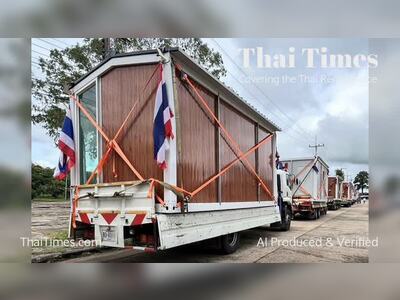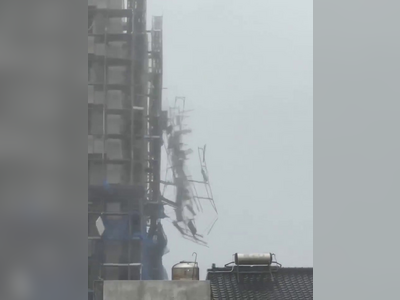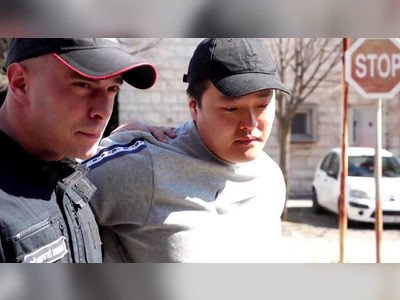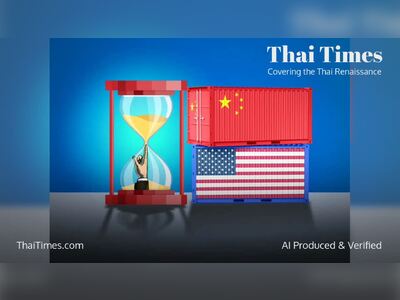Nvidia Faces Billion-Dollar Losses – Warns: China Is on Its Way to Becoming an AI Superpower
Jensen Huang urges the U.S. to treat artificial intelligence as a national strategic priority. According to him, China is aggressively investing in technology and talent – and has no intention of slowing down. "If the U.S. doesn’t respond with similar investments, it could lose its technological edge."
Jensen Huang, CEO of tech giant Nvidia, issued a stark warning over the weekend, urging American policymakers to adopt a "long-term strategic priority" for artificial intelligence. This, he stressed, should include national investment in developing an AI-focused workforce. "Fifty percent of AI researchers worldwide are Chinese, and China is far from lagging behind in the race," Huang emphasized. "This must impact how we think about the game."
Speaking at the Hill & Valley Forum in Washington, Huang — whose company manufactures the chips powering most advanced AI applications — stated, “To lead, the U.S. must embrace the technology, invest in re-skilling, and equip every worker with the knowledge required to use it.” He added in a briefing with reporters that while China may still be trailing the U.S. in the AI race, the gap is narrow: "They’re right on our heels."
Huawei Is Rising Fast
Huang specifically addressed China’s tech giant Huawei, which is currently under U.S. sanctions: “It’s one of the most formidable tech companies in the world, and they’ve made huge strides in recent years.” He revealed that Huawei is already developing its own AI chips for Chinese clients.
A Huawei store in Shenzhen is symbolic of the country's determination. "The Chinese have no intention of stopping," Huang noted.
Export Restrictions Are Hurting Nvidia
Nvidia has emerged as one of the biggest casualties of the escalating U.S.–China tech tensions, particularly concerning AI chip exports. Although it initially appeared the company might weather the storm, the export restrictions imposed by the Trump administration have significantly damaged sales of Nvidia’s H20 processors to China — critical chips used for AI development, research, and training.
The company estimates its earnings could take a hit of around $5.5 billion due to these restrictions. According to Nvidia, the U.S. measures are counterproductive: they are likely to push Chinese companies — especially Huawei — to accelerate the development of local alternatives, increase their investment in AI chip innovation, and make their technology more competitive, ultimately reducing reliance on Western suppliers. “We are risking our own advantage,” Huang warned.
Earlier this month, it was reported that Huang raised his concerns about China's rapidly growing AI capabilities — particularly Huawei’s — in a closed-door meeting between Nvidia executives and the U.S. House Foreign Affairs Committee.
A source from the meeting revealed that company executives argued that if DeepSeek R1 — a high-performing AI model developed by Chinese firm DeepSeek — had been trained on Huawei chips instead of Nvidia’s, it could have triggered a global surge in demand for Chinese-made chips.
AI: The New Industrial Revolution
In his remarks in Washington, Huang compared the current AI revolution to the Industrial Revolution. He said the United States historically succeeded because it “harnessed energy faster than any other nation” — rather than focusing on the displacement of workers. In that spirit, Nvidia recently announced a $500 billion investment plan for AI infrastructure in the U.S. over the next five years, which includes building an AI server factory near Houston in collaboration with Foxconn.
Despite his forecast that AI will eventually replace a large portion of today’s jobs, Huang does not share the widespread concern over worker displacement. According to him, the nature of work will evolve. At Nvidia’s recent conference in San Jose, he even predicted a global shortfall of at least 50 million workers by the end of the decade and unveiled Groot N1 — a foundational model for humanoid robots designed to help bridge that labor gap.
Speaking at the Hill & Valley Forum in Washington, Huang — whose company manufactures the chips powering most advanced AI applications — stated, “To lead, the U.S. must embrace the technology, invest in re-skilling, and equip every worker with the knowledge required to use it.” He added in a briefing with reporters that while China may still be trailing the U.S. in the AI race, the gap is narrow: "They’re right on our heels."
Huawei Is Rising Fast
Huang specifically addressed China’s tech giant Huawei, which is currently under U.S. sanctions: “It’s one of the most formidable tech companies in the world, and they’ve made huge strides in recent years.” He revealed that Huawei is already developing its own AI chips for Chinese clients.
A Huawei store in Shenzhen is symbolic of the country's determination. "The Chinese have no intention of stopping," Huang noted.
Export Restrictions Are Hurting Nvidia
Nvidia has emerged as one of the biggest casualties of the escalating U.S.–China tech tensions, particularly concerning AI chip exports. Although it initially appeared the company might weather the storm, the export restrictions imposed by the Trump administration have significantly damaged sales of Nvidia’s H20 processors to China — critical chips used for AI development, research, and training.
The company estimates its earnings could take a hit of around $5.5 billion due to these restrictions. According to Nvidia, the U.S. measures are counterproductive: they are likely to push Chinese companies — especially Huawei — to accelerate the development of local alternatives, increase their investment in AI chip innovation, and make their technology more competitive, ultimately reducing reliance on Western suppliers. “We are risking our own advantage,” Huang warned.
Earlier this month, it was reported that Huang raised his concerns about China's rapidly growing AI capabilities — particularly Huawei’s — in a closed-door meeting between Nvidia executives and the U.S. House Foreign Affairs Committee.
A source from the meeting revealed that company executives argued that if DeepSeek R1 — a high-performing AI model developed by Chinese firm DeepSeek — had been trained on Huawei chips instead of Nvidia’s, it could have triggered a global surge in demand for Chinese-made chips.
AI: The New Industrial Revolution
In his remarks in Washington, Huang compared the current AI revolution to the Industrial Revolution. He said the United States historically succeeded because it “harnessed energy faster than any other nation” — rather than focusing on the displacement of workers. In that spirit, Nvidia recently announced a $500 billion investment plan for AI infrastructure in the U.S. over the next five years, which includes building an AI server factory near Houston in collaboration with Foxconn.
Despite his forecast that AI will eventually replace a large portion of today’s jobs, Huang does not share the widespread concern over worker displacement. According to him, the nature of work will evolve. At Nvidia’s recent conference in San Jose, he even predicted a global shortfall of at least 50 million workers by the end of the decade and unveiled Groot N1 — a foundational model for humanoid robots designed to help bridge that labor gap.











